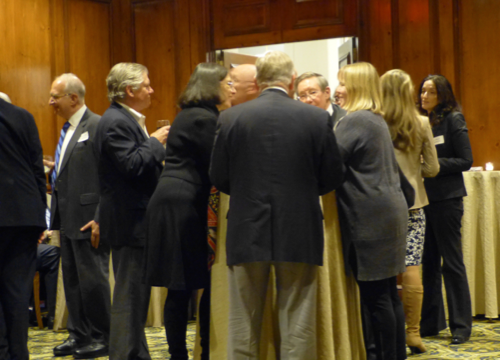50th Reunion Kick-Off Event
[av_textblock size=” font_color=” color=”]
On March 1, the 50th Reunion Committee launched its program of pre-Event-events with a gathering at the NYC Yale Club.
More than twenty New York area ’69ers (and some spouses) assembled to renew — or begin — Classmate acquaintances. Reunion Co-Chair BILL NEWMAN hosted, together with Co-Chairs J-P JORDAN (& MYRA) and DOUG COLTON, and Class Officer KEN BROWN.
WAYNE WILLIS introduced our new Class Web Site — including a separate page for each Class member! The site is still under construction, but available for trial use at www.yale1969.org.
For several hours those present checked out name tags, updated their personal myths, and waxed somewhat nostalgic. Amongst the conversational highlights were GEORGE MCNAMEE‘S impassioned-dervish account of the fate of several Regicides (judges who ordered the execution of King James) tenuously connected to Yale. George also exchanged with RICHARD FARREN seasoned anecdotes of their days hanging around the NY Governors’ Mansion with (now extinct) “moderate Republicans.”
Attendees included PETER & NICOLA CODDINGTON, TOM EMMONS, JOHN BEINECKE, BILL BESLOW, ART KLEBANOFF, KEITH NELSON, STEWART & PRISCILLA PALMER, BRUCE VOLPE, ARNOLD WELLES, JOHN NELSON, ERIC LENCK, PAUL GENNIS, CARNEY MIMMS, and SETH HERBERT (apologies to those present but not here noted).
Bill, Doug, and JP said that similar events will be held in other cities, as preludes to the Reunion and to create more ties within the Class: AYA says that ’69 is (along with ’70) the “least connected” of all Classes in modern times.
The Reunion Committee continues to need volunteers for a wide range of tasks. You can contact the Committee at yale69.50@gmail.com
[/av_textblock]
[av_one_full first min_height=” vertical_alignment=” space=” custom_margin=” margin=’0px’ padding=’0px’ border=” border_color=” radius=’0px’ background_color=” src=” background_position=’top left’ background_repeat=’no-repeat’ animation=”]
[av_gallery ids=’9965,9966,9967,9968,9977,9970,9971,9980,9972,9973,9974,9975,9983,9976,9982,9979,9981,9969′ style=’big_thumb’ preview_size=’portfolio’ crop_big_preview_thumbnail=’avia-gallery-big-no-crop-thumb’ thumb_size=’portfolio’ columns=’3′ imagelink=’lightbox’ lazyload=’deactivate_avia_lazyload’]
[/av_one_full]


I recommend everyone a) click on “Follow Comments” button above, then b) make a comment. That way, you’ll see how you get notified of comments when some subsequent visitor makes a comment.
I like the way the site looks!
I too like the way the site looks.
Glad to see our Class of 1969 is entering the digital age!!
What does it mean to be the “least connected” Class?
If anyone is traveling through Oregon, please connect. rshlachter@ssbls.com
Rob
Rob:
Good question. Jennifer Julier, at AYA, described us (and ’68) as the “least connected” Classes in her purview. She meant there was less interest in doing things with Classmates, or with Yale in general, than she observed with other classes. I think her comments were mostly quantitative rather than qualitiative: those who connect do so meaningfully, but fewer of us try than data from other classes would suggest. She, and others I’ve discussed this with, attribute it to the War and the general tumult on campus . . . tho that’s sort of a generic “causation” that may be accurate but isn’t satisfying. Why should it persist? Does it mean we didn’t get infused with the same “school spirit” that other Yalies absorbed? Anyway, the rep for being “disinterested” seems to create diminished expectations about Reunion involvement. Say it ain’t so, please! So, go boost!
Thanks –
djc
As for “least connected,” several hypotheses, all or none of which might help explian the distiction:
(1) Our class was part of a deliberate social experiment (now docmented in the literature of admissions policy) to maximize socio-economic diversity (as perceived in mid-century terms), including deliberate “mis-matching” of freshman tear roommates and heterogenous college assigments. Maybe this led to fewer lasting attachments. Or just a particlarly “mavericky” bunch of guys.
(2) We were pre-internet, and pre-social media, so any attempts by classes in our era to stay connected would almost certainly be more difficult than for classes that matriculated in the information age.
(3) The war and its associated social dynamics not only affected our attitudes towards politics and power, but also attitudes about privacy, information-sharing and networking (remember mantras like “trust no-one over 30,” ” tune in, turn on, and drop out,” and “mistrust authority and keep a low profile”?
(4) The war scattered us immediately after graduation, as many either entered the military or went to great lengths to avoid it (in my case, sending me to Kenya for two years of Peace Corps service, which effectively severed all my immediate connections). In later tears, “What did you do (or not do) in the war?” became a sensitive subject for many.
(5) Perhaps we are more connected with each other than it first appears, just not in ways perceptible to AYA or in ways that “official Yale” counts as “connected” to the institution itself.
Digging deeper into this “least connected” phenomenon might make for an interesting essay or academic study — assuming our “unconnected” classmates (a) could be located, and (b) would even agree to share information…
I agree with you, Lawrence. I would be interesting to know what AYA’s metric is. Is this notion one that marks ’68 and ’70 and shows a trend or is it an anomaly? I think co-education as well as the Black Panther demonstrations the next year may mark an inflection point and a kind of radical “reboot” of Yale’s cultural consensus that was clearly fraying through the sixties along with that of the rest of society. I appreciate the opportunity to reflect on these realities of our experience. Thanks, Lawrence.
Resolved to change that past characterization, the 50th Reunion Chairmen and the Organizing Committee have made already made giant strides towards modernizing our connectivity. The Class of 1969 website is highly functional and user friendly. The evolving 50th Reunion Classbook is being formatted to update every Classmate’s personal information, and facilitate information sharing. These resources will establish a solid foundation for enhancing and optimizing our 2019 on campus gathering.
We urge everyone to logon, sign-in, and contribute.